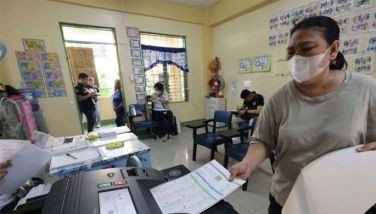Anti-piracy campaign gains ground in RP
November 21, 2005 | 12:00am
The Business Software Alliance (BSA) has lauded the Philippines’ effort in curbing software piracy, saying that the continuing progress of the Pilipinas Anti-Piracy Team (PAPT) in bringing down the level of software theft is encouraging.
In 2004, the BSA, a non-profit organization dedicated to promoting the safe and legal use of software, pegged the piracy rate in the Philippines at a high 71 percent, which is much higher than the average in Asia of 53 percent.
In a press luncheon, Tarun Sawney, BSA director for anti-piracy in Asia, revealed that the PAPT has confiscated P19 million worth of illegal software since it started its nationwide crackdown last Sept. 17.
Eight companies, according to Sawney, have been charged in court for violations of the Intellectual Property Code (IPC). Hopefully, he said this would contribute to further bring down the level of software piracy in the country.
The PAPT, composed of the National Bureau of Investigation (NBI), the Optical Media Board (OMB), the Philippine National Police (PNP) and the Intellectual Property Coalition (IPC), launched its intensified anti-piracy campaign in August.
The PAPT gave companies a one-month grace period, from Aug. 17 to Sept. 16, to get their houses in order and make their operations legal.
Since the anti-piracy campaign was launched, Sawney said calls to the BSA hotline has tremendously increased from an average of 40 to 50 calls per month to more than 600.
Earlier, the BSA announced that it was giving out cash rewards of up to P1 million to people who could provide leads on companies which use illegal software in their operations.
"The public response was great and we want to congratulate the PAPT in its ongoing crackdown against software thieves... We are happy with what we are seeing and we want it sustained," he said.
Calls to the BSA hotline, though, were not all meant to report illegal use of software; a lot of them were inquiries into the proper and legal use of software.
Nevertheless, Sawney said it was an indication of the increased level of awareness which the campaign has generated.
Since the BSA is not an enforcement agency, it can only give support to governments all over the world to sustain their respective anti-software piracy campaigns and help them succeed, especially in high-piracy countries such as the Philippines.
In a report released by the BSA and information technology market research tracker International Data Corp. (IDC) last July, losses due to software theft in the country was pegged at $69 million in 2004. While the piracy level has gone down one notch to 71 percent from 72 percent in 2003, much work is needed to bring it down further.
Sawney said the granting of cash rewards is a long process.
"First, we evaluate the information, then we conduct a thorough investigation about the company. We do our homework before we tip the local enforcement agency, then they conduct the raids and file the cases in court," he said.
In most cases though, Sawney said the information is accurate since it comes mostly from people who have access to primary sources of information such as employees of IT departments or former employees.
Regardless of the motives of the informants, the BSA is glad that the public is cooperating in the campaign not only against software theft but also against violations of intellectual property rights.
Any way you look at it, Sawney said piracy is affecting not only the IT sector, but also a lot more the music and publishing industries.
The study released in July revealed that with only a 10-point reduction in the level of software piracy, the IT sector in Asia could generate an additional $170 billion in revenue, create 1.1 million new jobs and generate another $15 billion in taxes since increased demand for software would translate into more production, marketing, and research and development.
"I would like to point out though that a lot of companies do obey the law," Sawney said.
Based on the profile of those caught in the latest crackdown, the reasons for using unlicensed software were varied. Avoiding cost is only one of the reasons. In a lot of cases, companies think that they won’t get caught, while some are simply unaware of existing laws that penalize the offense.
What is needed, according to Sawney, is an information campaign that will make companies aware of procedures of how to procure legal software, complemented by a strong implementation of intellectual property laws.
The BSA website itself gives out information on how to acquire licensed software and provides guides to software auditing services to help companies check on their systems.
This is complemented by seminars on software asset management organized by the BSA to help companies take advantage of their software investments, properly monitor their software, and avoid license misuse.
"We believe that making operations legal is the essential responsibility of organizations. We can only (guide) them in the right direction," Sawney said.
The BSA also welcomes a proposed bill in Congress for the setting up of intellectual property courts, which will allow judges and prosecutors to specialize in IT cases.
While it is too early to tell if the country’s piracy level would go down further in 2005 as a result of the PAPT’s campaign, as far as the BSA is concerned, it is one bright step in the right direction.
In 2004, the BSA, a non-profit organization dedicated to promoting the safe and legal use of software, pegged the piracy rate in the Philippines at a high 71 percent, which is much higher than the average in Asia of 53 percent.
In a press luncheon, Tarun Sawney, BSA director for anti-piracy in Asia, revealed that the PAPT has confiscated P19 million worth of illegal software since it started its nationwide crackdown last Sept. 17.
Eight companies, according to Sawney, have been charged in court for violations of the Intellectual Property Code (IPC). Hopefully, he said this would contribute to further bring down the level of software piracy in the country.
The PAPT, composed of the National Bureau of Investigation (NBI), the Optical Media Board (OMB), the Philippine National Police (PNP) and the Intellectual Property Coalition (IPC), launched its intensified anti-piracy campaign in August.
The PAPT gave companies a one-month grace period, from Aug. 17 to Sept. 16, to get their houses in order and make their operations legal.
Since the anti-piracy campaign was launched, Sawney said calls to the BSA hotline has tremendously increased from an average of 40 to 50 calls per month to more than 600.
Earlier, the BSA announced that it was giving out cash rewards of up to P1 million to people who could provide leads on companies which use illegal software in their operations.
"The public response was great and we want to congratulate the PAPT in its ongoing crackdown against software thieves... We are happy with what we are seeing and we want it sustained," he said.
Calls to the BSA hotline, though, were not all meant to report illegal use of software; a lot of them were inquiries into the proper and legal use of software.
Nevertheless, Sawney said it was an indication of the increased level of awareness which the campaign has generated.
Since the BSA is not an enforcement agency, it can only give support to governments all over the world to sustain their respective anti-software piracy campaigns and help them succeed, especially in high-piracy countries such as the Philippines.
In a report released by the BSA and information technology market research tracker International Data Corp. (IDC) last July, losses due to software theft in the country was pegged at $69 million in 2004. While the piracy level has gone down one notch to 71 percent from 72 percent in 2003, much work is needed to bring it down further.
Sawney said the granting of cash rewards is a long process.
"First, we evaluate the information, then we conduct a thorough investigation about the company. We do our homework before we tip the local enforcement agency, then they conduct the raids and file the cases in court," he said.
In most cases though, Sawney said the information is accurate since it comes mostly from people who have access to primary sources of information such as employees of IT departments or former employees.
Regardless of the motives of the informants, the BSA is glad that the public is cooperating in the campaign not only against software theft but also against violations of intellectual property rights.
Any way you look at it, Sawney said piracy is affecting not only the IT sector, but also a lot more the music and publishing industries.
The study released in July revealed that with only a 10-point reduction in the level of software piracy, the IT sector in Asia could generate an additional $170 billion in revenue, create 1.1 million new jobs and generate another $15 billion in taxes since increased demand for software would translate into more production, marketing, and research and development.
"I would like to point out though that a lot of companies do obey the law," Sawney said.
Based on the profile of those caught in the latest crackdown, the reasons for using unlicensed software were varied. Avoiding cost is only one of the reasons. In a lot of cases, companies think that they won’t get caught, while some are simply unaware of existing laws that penalize the offense.
What is needed, according to Sawney, is an information campaign that will make companies aware of procedures of how to procure legal software, complemented by a strong implementation of intellectual property laws.
The BSA website itself gives out information on how to acquire licensed software and provides guides to software auditing services to help companies check on their systems.
This is complemented by seminars on software asset management organized by the BSA to help companies take advantage of their software investments, properly monitor their software, and avoid license misuse.
"We believe that making operations legal is the essential responsibility of organizations. We can only (guide) them in the right direction," Sawney said.
The BSA also welcomes a proposed bill in Congress for the setting up of intellectual property courts, which will allow judges and prosecutors to specialize in IT cases.
While it is too early to tell if the country’s piracy level would go down further in 2005 as a result of the PAPT’s campaign, as far as the BSA is concerned, it is one bright step in the right direction.
BrandSpace Articles
<
>
- Latest
Latest
Latest
January 6, 2025 - 11:05pm
January 6, 2025 - 11:05pm
December 1, 2024 - 3:59pm
December 1, 2024 - 3:59pm
November 18, 2024 - 12:00am
November 18, 2024 - 12:00am
November 12, 2024 - 9:00am
November 12, 2024 - 9:00am
Recommended






























